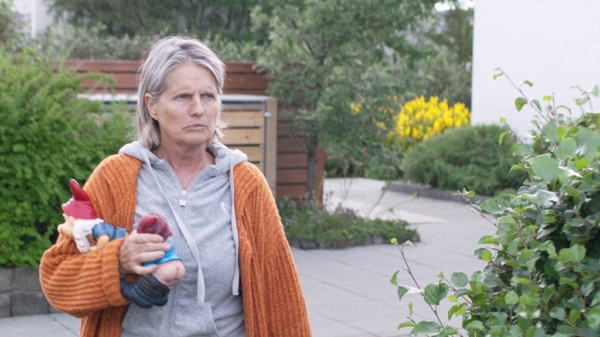Under the Tree begins with a young man getting caught by his wife watching porn, and he promptly gets kicked out of the house after she realizes the two in the video are her husband and his ex-girlfriend. The man insists he hasn’t cheated, but to no avail. His name is Atli, the most soulful of a fairly soulless group of people that inhabit this dark, deadpan, satirical film from Iceland.
Atli retreats to his parents’ suburban home to recuperate, but he finds they are having troubles of their own. They have a large oak tree in their backyard that casts a looming shadow on a neighbor’s lawn and blocks the sun. Ever since the next-door neighbor married his all-too obvious trophy wife, Eybjorg (Selma Bjornsdottir), he’s been asking Atli’s folks to trim the tree so Eybjorg can sunbathe. Atli’s mom, Inga, full of anger and judgment toward the younger woman, refuses, or more particularly, tells her passive husband Baldwin (Sigurdur Sigurjonsson) to refuse. And so we begin the slow escalation of neighborly resentment that starts with snide comments and ends, well, pretty much where you expect it.
Director and co-writer Hafsteinn Gunnar Sigurdsson has a lot on his mind in his meticulously constructed slow burn of a picture. He takes on the “simmering emotions hidden beneath placid suburbanites that lead to violence” trope, but he locates the nexus of these emotions differently. Atli’s older brother has disappeared and is presumed to have committed suicide, and the family has not quite recovered. In particular, Inga, who holds out hope that her son is still alive, has transformed her grief into a sharp knife that she thrusts at everyone around her. Once her target turns to her neighbors, she is convinced they are out to embarrass and harass her, and she will not be denied.
This is the main point that Sigurdsson wants to drive home. With suspicion and close-mindedness, there is no community and inevitably things break down. Time after time, Inga insists that Ebyjorg is surreptitiously harassing her and ignores Eybjorg’s denials. That drop of poison turns as Eybjorg starts suspecting the same of Inga. Meanwhile, Atli refuses to listen to his wife’s need for space. In turn, Agnes (Lara Johanna Jonsdottir) shuts him down, shuts him out, and refuses him access to their young daughter. If everyone suspects the worst of each other, that’s what they are going to get. Atli seems to be the only character attempting, however dim-wittedly and naively, to move toward an understanding of himself and others. But he is a lamb compared to the conniving of everyone around him, and we know what happens to lambs.
Sigurdsson takes his time telling his story, allowing the resentments to fester while slowly but surely turning up the heat. Cinematographer Monika Lenczewska allows her camera to glide gracefully, impassively watching the foibles and prejudices of the neighbors come to light. She is as impersonal as the slate gray sky above their heads and the sleek though dull homes they live in.
Director Sigurdsson is a bit like a surgeon, diagnosing the problem with precision yet not caring much about the patient. His biggest sin is casting the two neighboring wives as, essentially, shrews who berate the masculinity of their husbands in an effort to goad them into action. Aside from that fact that this sort of character type is a) woefully not of its time and b) a cliché, Inga drives the narrative and is the most abrasive and uncompromising of the lot. She starts at 11 and just dials up in stubbornness and bitchiness from there. Edda Bjorgvinsdottir does an admirable job with the part but is weighed down by her character’s overly curdled resentment.
Sigurdsson does much better with Atli, who makes the transition from a bemused, angry young man—stalking his wife, throwing cellphones, and attacking children’s furniture in a daycare center—to weary accepting his state and the feelings of others. Steinthor Hroar Steinthorsson calibrates his performance beautifully. There are wonderful moments with Atli and his daughter where you see his childlike innocence, and his incredulity when he is reprimanded for taking his daughter out of school for a few hours is priceless. He loves her and wouldn’t hurt her, so why would this be such a big deal? That aforesaid innocence turns into what is essentially a temper tantrum, enforcing the idea that Atli, though immature, is the most honest one, who only wants to be treated fairly.
But we inevitably head back to the neighbors’ spat, which, by the end, is too obvious and predictable and saps some of the goodwill established by Atli’s story line. All in all, Under the Tree is well made but predictable—and more than a bit misogynistic.







Leave A Comment